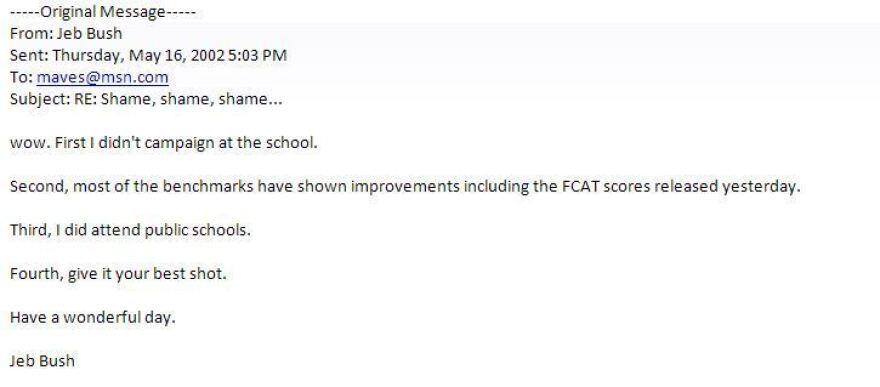Not-quite-yet presidential candidate Jeb Bush posted the first chapter of an e-book about his two terms as Florida governor online Monday, along with six massive files containing a quarter-million of his official emails.
This was something Bush said he would do back when he announced he was "actively exploring the possibility" of running for president. (He's since explained the phrase is legalese he is using for now; the lack of an actual candidacy allows him to raise unlimited donations for a super PAC supporting him — something that will be impossible once he is a candidate.)
In his introduction, Bush explains that he made a point of making sure average Floridians had access to him via email, and he estimates that he spent an average of 30 hours per week reading and responding to it.
At least some Floridians had trouble believing he was actually doing this. One woman wrote to complain about semitrailers on Interstate 75, but then added: "By the way, are you really Jeb or a staff member? Just curious." Bush responded: "I am jeb." And then referred her to the Department of Transportation.
Here are five things we learned from the chapter — and the emailing habits of the man who referred to himself as Florida's "eGovernor:"

1) Bush loved his job.
The two-term GOP governor starts out his ebook saying so:
"I loved being the governor of Florida," he wrote. "It was my dream job, and that feeling never changed, not in eight years. Not through the hurricanes, budget debates, or even hanging chads."
Read even a few pages of his correspondence, and the time and attention he paid to any number of issues, big and small, quickly become clear. A Jan. 15, 1999, email at 8:36 pm to chief of staff Sally Bradshaw, for instance, sets out an agenda for a coming staff meeting:
In layman's terms: Medicaid prescription drug purchasing; the creation of an endowment fund with money collected from the state's successful lawsuit against the tobacco industry; a revamping of state services for children with developmental disabilities; a new program to mentor at-risk children.
All but the last were highly technical in nature, and Bush was right at home down in the policy weeds.
2) No, it's not his White House agenda.
Those hoping for an outline of what he might do were he elected president will be disappointed. Bush's e-book is less a narrative than a series of brief explanations of a topic followed by emails about that topic. The chapter released Tuesday covers his first month in office. The rest of the book will be released by the end of this year.
3) Some transparency about Bush's transparency
Although Bush cites the "spirit of transparency" as the reason to release all these emails, there is also the fact that he had no control over it. Florida has one of the most comprehensive public records laws in the country, and emails by a public official pertaining to public business are (with some specific exceptions, such as the privacy of children) open to public inspection.
The emails Bush posted today were public from the instant they were sent or received. Many reporters requested and received them (with varying degrees of bureaucratic and cost hurdles) in real time, and several news organizations, including NPR, requested and received the entire set from the Florida State Archives.
In other words, Bush's use of them for his own book can be seen as attempting to take a potential liability and turn it into an asset — making political lemonade from the lemons Florida law saddled him with.
4) A limited level of candor
Those looking for complete candor about the functioning of Bush's governor's office will also be disappointed. Within a month of officially taking office, Bush and his staff were keenly aware their correspondence was serving as fodder for news coverage.

When his staff began debating later that year whether the amount of vacation time they were getting was appropriate, Bush advised that they take their discussion offline.
"I suggest that you guys have a verbal conversation about it rather than create a public document," he wrote. He did, however, finish the thought with a smiley face.
5) The governor's competitive streak
Despite knowing that everything he was typing someday would become public, Bush sometimes hit the send button when perhaps he shouldn't have. In a May 2002 email, he reveals both the competitive streak and flash of temper that were well known inside the Capitol building.

A Democratic voter sent him an email with the subject line "Shame, shame, shame..." to criticize his education plan and vowed to boot him from office that November. Bush responded by defending his record and then finished: "Give it your best shot," and "have a wonderful day."
Bush won his re-election easily.
Copyright 2020 NPR. To see more, visit https://www.npr.org. 9(MDAwMzY5MzE4MDEzMTE3ODg5NDA4ZjRiNg004))

